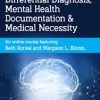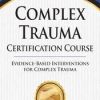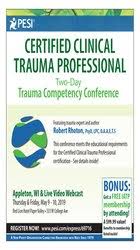Certified Clinical Trauma Professional: Two-Day Trauma Competency Conference – Robert Rhoton | Available Now !
$299.00 Original price was: $299.00.$85.00Current price is: $85.00.
Certified Clinical Trauma Professional: Two-Day Trauma Competency Conference – Robert Rhoton | Instant Download !
Sale page_https://catalog.pesi.com/item/48204/
Archive: https://archive.fo/oUVmw
The successful resolution of traumatic stress can be simple.
Studies indicate that there are four key elements to effective trauma treatment. When you accomplish these four key elements in treatment with your clients, you will be able to reduce their symptoms and improve clinical outcomes.
Watch this live webcast conference and you will walk away with a step-by-step four-stage framework for navigating essential elements of trauma treatment with your traumatized clients.
The essential elements are common to all evidence-based trauma treatments. You will learn how you can integrate this framework with your current approach or methodology to make your trauma treatment even more effective!
This trauma competency training can transform your clinical practice and help improve your trauma treatment outcomes, just as it has for other clinicians around the world.
- Examine the nature of traumatic stress, grief, & loss and their sequelae.
- Analyze the clinical application of various theoretical treatment models for traumatic stress, grief & loss.
- Evaluate traumatic stress, grief & loss from biochemical, psychological, social & spiritual perspectives in order to improve clinical outcomes.
- Examine the clinical research that supports the imperative factors that influence the efficacy of trauma treatment.
- Assess the comorbidity of traumatic stress in other diagnoses, including personality disorders and Dissociative Identity Disorder, and identify appropriate treatment interventions.
- Provide psychoeducation and cognitive restructuring techniques for maximizing client engagement and participation in early stages of treatment.
- Determine the efficacy of self-regulation skills as a preliminary treatment intervention for trauma.
- Articulate the 10 core competencies of traumatic stress, grief and loss and specify the clinical application of each.
- Incorporate clinical interventions and techniques for the initial assessment, safety and stabilization phase of treatment as well as the remembrance and mourning phases of trauma treatment.
- Examine the potential clinical limitations and benefits of completing a needs assessment for better progress in treatment.
- Develop clinical skills to support and facilitate recovery from complicated bereavement in clients.
- Incorporate CBT skills to promote the development of stability, self-efficacy, anxiety management, and relational capacities in traumatized clients.
A Brief History and Evolution of Traumatic Stress, Grief & Loss
- Systemic traumatic stress theory
- Symptom review
- Review of effective treatments
- Tri Phasic model
- Most commonly used instruments to assess traumatic stress
Core Competencies of Traumatic Stress, Grief & Loss
Bio-Psycho-Social-Spiritual Factors that Produce Anxiety & Traumatic Stress
- Precipitating events
- Meaning making
- Physiology of trauma
- Perception
Adaptive and Maladaptive Coping Behaviors
- Trauma adaptation
- Systemic influences
- Emotional & psychological stressors
- Integrated theoretical concepts from stress, crisis & trauma theories
- Information Processing Model
- Psychosocial Model
Review of Effective Treatment Interventions
- Cognitive Behavioral Techniques (PE, CPT & SIT)
- EMDR & Bilateral Stimulation
- Thought Field Therapy (TFT)/Emotional Freedom Techniques (EFT)
- Sensorimotor
The Biochemical, Affective, and Cognitive Impacts of Traumatic Stress
- Affective volatility
- The body keeps the score
- Biology of traumatic stress
The Impacts of Traumatic Stress Over Time & Across & Within Developmental Stages
- Epigenetics
- Reactive Attachment Disorder
- Adrenal fatigue
The Role of Traumatic Stress in Clinical Disorders such as Personality Disorders, Dissociative Identity Disorder, and More
- Traumagenesis
- Traumaddiction
- Comorbidity
Conceptualizing a Framework of Healing for Survivors of Traumatic Stress
- Systemic perspective
- Strengths perspective
Traumatic Stress Exists Across the Continuum of Systemic Levels
- Systemic trauma theory
- Community trauma
- Vicarious secondary traumatization
Theories of Traumatic Stress, Loss and Grief
- Information Processing Model
- Psychosocial Model
- Contemporary thoughts
Bereavement and Adjustment Disorders
- Supporting normal bereavement
- Treating complicated bereavement
Assessment of Traumatic Stress Disorders
- Diagnostic and Statistical Manual of the APA
- DSM-5® changes
- ACE & Developmental Trauma
- Diagnosing PTSD with the PCL-5
Evidence-Based Techniques/Interventions
- Relaxation/Self-regulation
- Grounding
- Containment
- Writing/journaling
- Drawing art
- Healing metaphors
- Transitional objects
Demonstrations: Interactive Exercises/Application of Skills
- Cognitive Behavioral Techniques
- Narrative Exposure Therapy Technique
- Thought Field Therapy (TFT)
- Bilateral Stimulation
Limitations of the Research and Potential Risks
- Limitations of many accepted models of trauma treatment
- Weaknesses and limitations of evidence-based trauma treatment models
- Limitations of the diagnostic (DSM-5®) system
- Limitations and potential risks in grief work, due to research scarcity on the topic
Closure: Lessons Learned
Tag: Certified Clinical Trauma Professional: Two-Day Trauma Competency Conference – Robert Rhoton Review. Certified Clinical Trauma Professional: Two-Day Trauma Competency Conference – Robert Rhoton download. Certified Clinical Trauma Professional: Two-Day Trauma Competency Conference – Robert Rhoton discount.
1 review for Certified Clinical Trauma Professional: Two-Day Trauma Competency Conference – Robert Rhoton | Available Now !
Add a review Cancel reply
Related products
NLP & Hypnosis
Ecommerce
NLP & Hypnosis
NLP & Hypnosis












Jayla Dunlap –
Great Store!!! | Certified Clinical Trauma Professional: Two-Day Trauma Competency Conference – Robert Rhoton